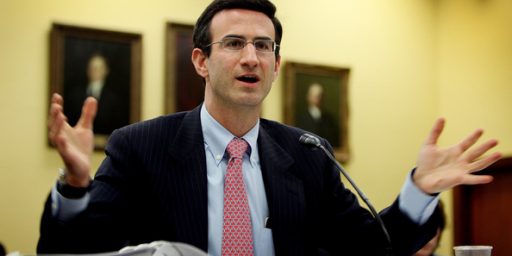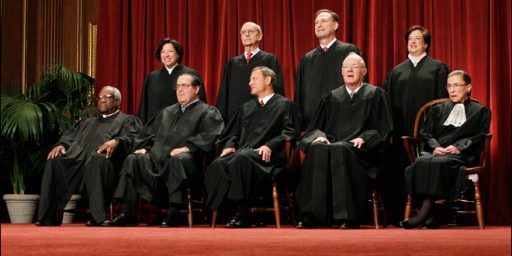Peter Orszag and the Corruption Inherent in the System
Peter Orszag, President Obama's first budget director, is headed to Citigroup and a multimillion dollar salary.
Peter Orszag, President Obama’s first budget director, has joined Citgroup as a vice chairman and a member of its “senior strategic advisory group, a counsel of political and financial hands that its bankers can bring into the most complex situations.” Credible estimates put his compensation as “at least $2 million to $3 million.”
Harold Pollack, for one, is “disgusted.” He observes, “With the exception of the president himself, Orszag was arguably the most important economic policymaker in the entire Obama administration. Orszag’s OMB role, his fingertip familiarity with policy, the budget process, and congressional policymakers made him central to the stimulus and health reform efforts. He was President Obama’s right hand man for much of that work, and more besides. He accumulated the ultimate rolodex of people inside and outside government, within the United States, and perhaps globally, too.” Further, while Orszag is prohibited by law from directly lobbying government, “A huge bank’s strategic interactions with government hardly begin or end with the legal or even the commonsense definition of lobbying. His inside knowledge of presidential policymaking, regulatory processes, and congressional politics will be valuable-sometimes for good ends, sometimes not—whether or not he ever does actual lobbying.”
It’s hard to fault Orszag for this. He’s an extraordinarily sought after figure, having achieved his previous position at age 41 and having been a senior advisor to Bill Clinton in his early 30s. Getting the government stamps on his passport doubtless sped him along but, frankly, he wouldn’t have agreed to serve if it meant sacrificing the enormous incomes that are the draw to banking.
No, as James Fallows observes, the problem is the system.
[H]is move illustrates something that is just wrong. The idea that someone would help plan, advocate, and carry out an economic policy that played such a crucial role in the survival of a financial institution — and then, less than two years after his Administration took office, would take a job that (a) exemplifies the growing disparities the Administration says it’s trying to correct and (b) unavoidably will call on knowledge and contacts Orszag developed while in recent public service — this says something bad about what is taken for granted in American public life.
Rather than expecting austerity, Fallows argues that we should allow people like Orszag to cash in differently:
He could have gone to a lucrative job at a business school or even a think tank, for perhaps half-a-million per year versus many millions. He could have written a book and gone big time on the lecture circuit. He could have taken a corporate job somewhere other than finance. He could have taken a finance job someplace other than Citibank (or Goldman Sachs or AIG etc..)
Then again, I don’t know many business schools and think tanks that pay half a mil salaries.
Another alternative, I suppose, would be to hire senior economic policymakers from somewhere other than Citigroup and Goldman Sachs. As it is, the revolving door is not only lucrative but the best route to government power.






I don’t think you have quite explained why you refer to this as “inherent corruption”. In what way is what Orszag is doing corrupt? Yes, he has served at the highest levels in government and has gotten to know lots of people. Now that knowledge is a resource for his employer. What is inherently wrong with that? If he uses his knowledge to carry out some dasterdly, or illegal scheme, then obviously that would be a problem. But there is no indication of that. What exactly is the problem here?
The problem is summarized in Pollack’s post. There is at least the appearance of, if not a quid pro quo, a tacit understanding and it’s really not escapable. As Dan Rostenkowsk once put it, never take a bribe—just give ’em your business card.
Caesar’s wife must be above reproach. Suetonius reported Caesar as saying meos tam suspicione quam crimine iudico carere oportere (my wife should be as free of suspicion as she is from a crime itself). It’s not enough for the president’s most highly placed advisers not to have been guilty of corruption in office. They must avoid even the suspicion of corruption.
The reason for this is implied in Fallows’s post: he assumes, without direct knowledge, that Orszag’s probity is of the very highest. Should he?
At least we know his taxes won’t go up.
No doubt he’ll be generating lots of jobs with that $2-3M.
Heaven knows Citi could not be hiring if Orszag were taxed at the old levels.
Dave,
You are not serious are you? Spell out exactly what you mean here. You are claiming that during the financial crisis, Orszag must have had some nod-and-a-wink agreement with Citicorp that he would do their bidding during internal discussions in exchange for being allowed to cash in later on? Is this the scenario that you find inescapable?
I think Orszag is totally, 100% free of any suspicions of that kind. But since you obviously disagree, then please share with us whatever relevant information you have that would constitute evidence to support your position.
“They must avoid even the suspicion of corruption.”
That is an utterly ridiculous standard. It could only work in a world populated soley by fair-minded rational people. As it is, all you need is one person to stand up and say – “I am suspicious of Mr. X”, and voila, the person is under suspicion. Even if that accuser has no evidence whatsoever. Even if that accuser has some ulterior motive for making the accusation. Which, of course, is the usual case.
This is just one SMALL example of how the uber elites ( Republicans as well) are systematicaly and legally looting the system in plain sight in front of us all.
And we as a people, sit SLACK JAWED AND BLANK EYED helplessly watching it happen.
August 9,378 AD approaches.
Tano, it doesn’t need to rise to anything overt to be destructive. All it takes is for the big firms and government functionaries to develop common cause. They will, naturally. That’s the way human ‘work groups’ evolve. Swapping roles (“never take a bribe—just give ‘em your business card”) obviously amplifier that.
People start taking their role as the one they are playing today, with the recognition that they may be on the other side of the fence tomorrow.
Too bad the peoples (zorro reference) don’t have a seat at that table.
Sounds like another argument for much smaller government.
Who then should government put in a position like that at OMB? Someone from academia who goes back to academia? They are elitists and out of touch. Businessmen go back to being businessmen, same corruption issue. That leaves?
Steve
How about going back to a regional firm, one not dependent on federal contacts?
One alternative, steve, would be for government service in high-ranking appointive capacity to be the capstone of a lengthy career rather than a stepping stone for somebody in the middle of his or her career.
Dave- How do you guarantee they do not go back to industry? How do you guarantee that they do not favor that same industry in which they worked for 30 years or more? Same with an academic. While they may not directly benefit, what about friends and family? Do you want people who are exclusively in their 60s or 70s in those positions?
Steve
“One alternative, steve, would be for government service in high-ranking appointive capacity to be the capstone of a lengthy career…”
Sorry Dave, but that is just nuts. You are going to arbitrarily exclude 80-90% of the qualified people from serving in government? Is this some version of ‘starve the beast”, in this case, of intellectual firepower?
Here is a radical concept. Fully enforce laws against actual corruption, and stop trying to stamp out any possible appearance of something. I sense you probably have, as part of your basic worldview, an extreme skepticism of anyone in positions of authority. Combine that with the standard you have been advancing here, basically that no one should hold a position of responsibility unless they are beyond suspicion, and you have erected an impossible and unworkable standard.
And the end result of that is that the standard gets trotted out and applied to certain people in a totally arbitrary manner, while others, who might be equally eligible for suspicion, are left in peace.
Meanwhile, the real corruption continues apace: A Secretive Banking Elite Rules Trading in Derivatives
Tano, the structure of the Wall Street bailouts favored large and connected players, while doing little for “the Peoples.” In particular:
“[The Fed] Created a variety of lending facilities to enable the Fed to lend directly to banks and non-bank institutions, against specific types of collateral of varying credit quality. These include the Term Auction Facility (TAF) and Term Asset-Backed Securities Loan Facility (TALF).” (wikipedia)
Now, when government officials are granting near-0% loans on “collateral of varying credit quality” … what are you going to look for to find “actual corruption?”
And if those same officials cycle out to work at the same institutions they’ve been loaning to, how do you feel?
Now, the rest of the news. From Roger Weigand:
System weaknesses we see are (1) A Chinese real estate bubble is popping and taking down their stock markets. Fallout from this will cause a chain reaction moving into other markets in Europe, Asia and North and South America. It doesn’t take a genius to figure out where this race to the bottom goes next. (2) First we get capital controls, price controls and then inflation. This produces some real economic pain and struggle. (3) However, the last phase is the really bad one-hyperinflation!
The first inflation phase is followed by hyperinflation and then a banking-system collapse. It’s not the end of the world as life goes on; but for millions of spoiled American brats; they will simply not be able to cope. They’re headed for major denial, and all kinds of social problems. It’s too bad it’s come to this as created by a bunch of greedy bankers and One-Worlder’s. It’s not nice to say but we wish them the worst and no mercy. They have literally destroyed our entire economic world for decades.
In the 1919-1923 European hyperinflation following WW I, hundreds of bankers and politicians were simply assassinated. (Read the book “When Money Dies” by Adam Fergusson). Could this possibly come again? We hope not but keep in mind Americans own millions of guns. When these people get very angry after being totally cleaned out, you tell me what happens next?
Pete, for me the main argument against hyperinflation is that ‘everybody’ expects hyperinflation.
It is the converse of the “nobody expects the Spanish Inquisition” argument.
More likely we’ll slog along with something not good, not terrible, but not so dramatic as TEOTWAWKI.
I see world wide sovereign defaults and/or monetization of debt on the horizon. How it affects the US will try to be contained by spin. Not sure of the time frame. Eventually there will be another world war as it is inevitable, given historical precedent. Could be against China, or between China and India, as they try to take advantage of the financial weakness of the other industrial powers. Commodities, including oil especially, will skyrocket, and the oil spike will exacerbate the financial system problems. Hope I’m wrong.
“Eventually there will be another world war as it is inevitable, given historical precedent.”
Really? Nuclear weapons seem to have dealt a blow to that inevitability…